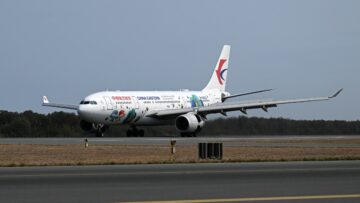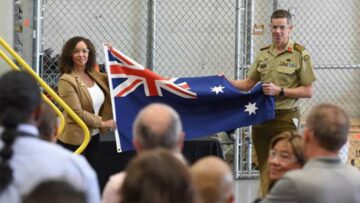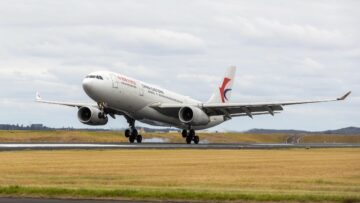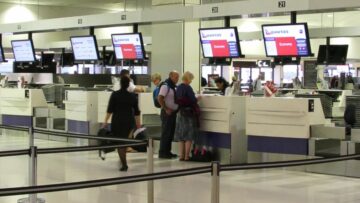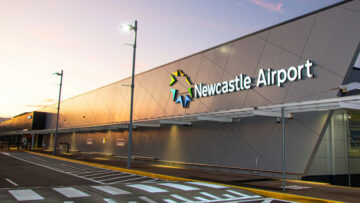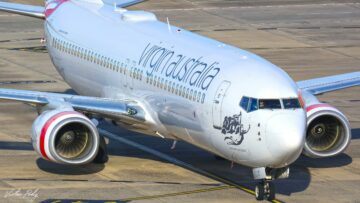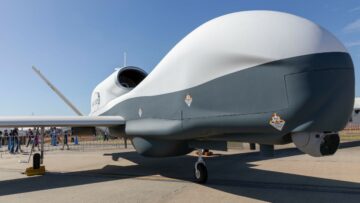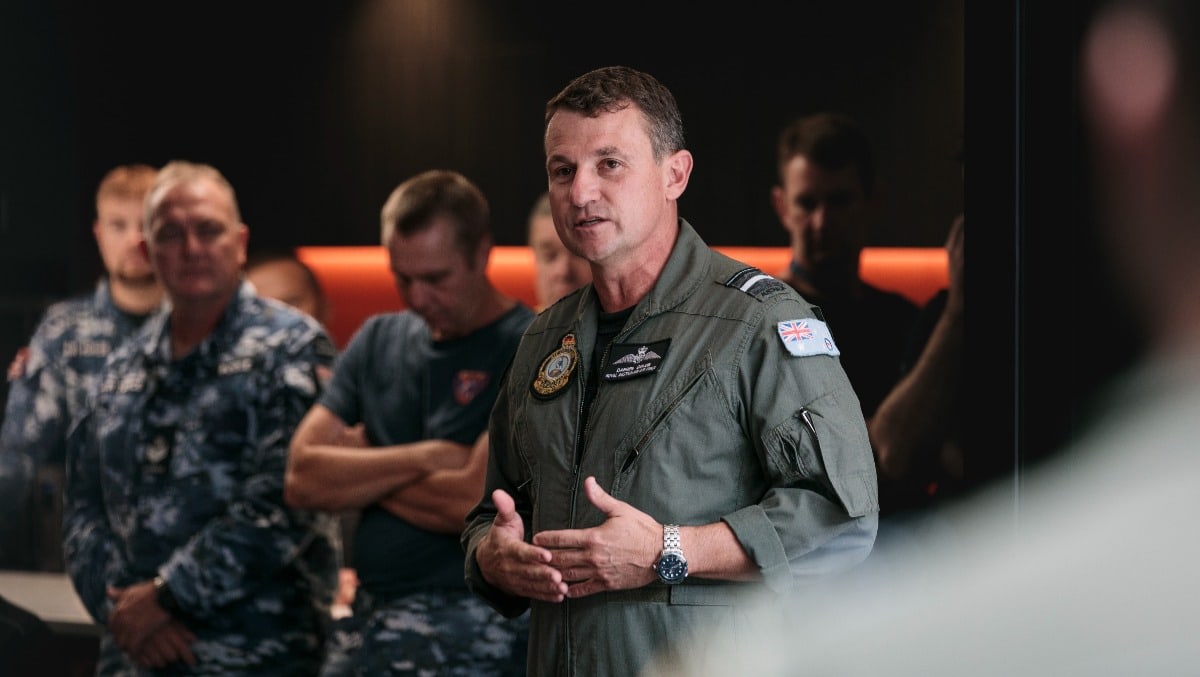
One of the RAAF’s most senior figures has been appointed to a new role overseeing Australia’s response to major cyber attacks.
Air Vice-Marshal Darren Goldie, a former Hercules pilot, will move from being Air Commander to the nation’s first cyber security coordinator.
Prime Minister Anthony Albanese said Goldie’s appointment was a “vital component” of the government’s response to cyber security threats.
“The coordinator, together with the national office of cyber security within the office of Home Affairs, will ensure that we are well-positioned to respond to the opportunities but also the challenges that are there in this digital age,” Albanese said.
“In this role, Air Marshal Goldie will support the minister of cyber security to lead the coordination of national cyber security policy, responses to major cyber incidents, work of whole of government cyber incident preparedness efforts and, of course, strengthening commonwealth cyber security capability.”
Goldie joined the RAAF in 1993 and in April last year assumed the role of Air Commander Australia, where he was tasked with effectively preparing air combat forces.
Growing up on the Gold Coast, he went on to fly C-130 E, H and J model Hercules on operations in East Timor, Iraq and Afghanistan.
He was an A Category Captain who flew 5,000 flying hours and served as Commanding Officer of No. 37 Squadron in Sydney from 2012 to 2015 and Officer Commanding No. 92 Wing in Adelaide in 2017 and 2018.
PROMOTED CONTENT
Minister for Home Affairs and Cyber Security, Clare O’Neil, said that the former government left the state of cyber security in Australia an “absolute mess” and that the appointment of a cyber security coordinator is a crucial part of the “jigsaw puzzle” that is taking control of the current cyber climate.
“[Goldie] will drive the work across government in cyber security with force and velocity that is needed to meet what is a very substantial and seriously growing challenge for our nation,” Minister O’Neil said.
The appointment of a cyber security coordinator has been discussed for months now, with Minister O’Neil consistent in the opinion that cyber security needs to be coordinated and centralised.
“It’s absolutely essential that we better coordinate the work that is happening within government; we have a whole range of government departments that are doing really important work … the problem is that at the moment, they’re all rolling in different directions,” she said in February.
Air Vice-Marshal Darren Goldie’s promotion out of the RAAF significantly follows Air Vice-Marshall Catherine Roberts’s promotion to be the inaugural head of Australia’s military Space Command.
The push to better secure Australia against cyber threats comes after a number of high-profile cyber attacks on Australian organisations, with millions of people affected.
Last year saw both Optus and Medibank hit by multimillion-dollar ransomware attacks that affected 11 million and 9.7 million individuals, respectively, while Latitude Financial was hit early this year, affecting an additional 7.9 million.
Since then, several supply chain attacks have potentially compromised government agencies at both state and federal levels, with the recent HWL Ebsworth hack affecting the Office of the Australian Information Commissioner, among others.
Shadow Cyber Security Minister James Paterson has said that a cyber security coordinator should have been appointed months before the HWL Ebsworth attack and that the new role must begin clean-up immediately.
“The coordinator’s first task must be to get to the bottom of what government data has been lost in this attack and be transparent with the public about it, given the Albanese government’s failure to do so,” Paterson said.
- SEO Powered Content & PR Distribution. Get Amplified Today.
- PlatoData.Network Vertical Generative Ai. Empower Yourself. Access Here.
- PlatoAiStream. Web3 Intelligence. Knowledge Amplified. Access Here.
- PlatoESG. Automotive / EVs, Carbon, CleanTech, Energy, Environment, Solar, Waste Management. Access Here.
- BlockOffsets. Modernizing Environmental Offset Ownership. Access Here.
- Source: https://australianaviation.com.au/2023/06/raaf-air-commander-takes-top-cyber-role/
- :has
- :is
- :where
- $UP
- 000
- 11
- 116
- 2012
- 2015
- 2017
- 2018
- 7
- 9
- a
- About
- about IT
- absolutely
- across
- Additional
- Affairs
- affecting
- AFGHANISTAN
- After
- against
- age
- agencies
- AIR
- All
- also
- among
- an
- and
- Anthony
- appointed
- appointment
- April
- ARE
- AS
- assumed
- At
- attack
- Attacks
- Australia
- Australian
- BE
- been
- before
- begin
- being
- Better
- both
- Bottom
- but
- by
- capability
- Category
- Catherine
- centralised
- chain
- challenge
- challenges
- Climate
- Coast
- COM
- combat
- comes
- commissioner
- commonwealth
- Compromised
- consistent
- control
- coordinate
- coordinated
- coordination
- Coordinator
- course
- crucial
- Current
- cyber
- Cyber Attacks
- cyber security
- Darren
- data
- departments
- different
- digital
- digital age
- discussed
- do
- doing
- drive
- e
- Early
- East
- effectively
- efforts
- ensure
- essential
- Failure
- February
- Federal
- Figures
- financial
- First
- flying
- follows
- For
- Force
- Forces
- Former
- from
- get
- given
- Gold
- Government
- Growing
- hack
- Happening
- Have
- he
- head
- high-profile
- Hit
- Home
- HOURS
- HTTPS
- immediately
- important
- in
- Inaugural
- incident
- individuals
- information
- iraq
- IT
- james
- joined
- jpg
- Last
- Last Year
- latitude
- lead
- left
- levels
- lost
- major
- Meet
- Military
- million
- millions
- minister
- model
- moment
- months
- most
- move
- must
- nation
- National
- Nations
- needed
- needs
- New
- no
- now
- number
- of
- Office
- Officer
- on
- Operations
- Opinion
- opportunities
- Optus
- Organisations
- Others
- our
- out
- overseeing
- part
- People
- pilot
- plato
- Plato Data Intelligence
- PlatoData
- policy
- potentially
- preparing
- Problem
- promotion
- public
- Push
- range
- ransomware
- Ransomware Attacks
- really
- recent
- Respond
- response
- responses
- Role
- Rolling
- Said
- saw
- secure
- security
- Security threats
- senior
- several
- she
- should
- significantly
- So
- Space
- State
- strengthening
- substantial
- supply
- supply chain
- support
- sydney
- takes
- taking
- Task
- that
- The
- The State
- then
- There.
- this
- this year
- threats
- to
- together
- top
- transparent
- VeloCity
- very
- was
- we
- went
- What
- What is
- while
- WHO
- whole
- will
- Wing
- with
- within
- Work
- year
- zephyrnet


